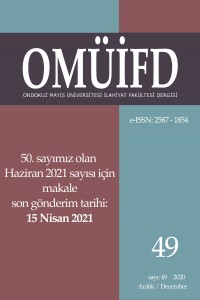The Qur’an Courses in the Ilıtam Programs in Terms of Complexion, Quality and Curriculum (Ondokuz Mayıs University Example)
Abstract
Since the beginning of the study activities in the Theological Faculty of Ankara University in 1949, which is the first founded theological faculty of the Türkey, a theological faculty has been opened in almost every city. In addition, the “Theology Undergraduate Program” (Ilitam), which is part of some theology faculties, currently continues education through the distance education centers of these universities. Ilitam programs are two years programs that includes second and third year undergraduate courses. Although these programs have many advantages, they have ne-gative aspects especially for courses with practical dimensions such as the Qur’an. According to traditional approaches and practices, the teac-hing of the Qur’an reading and recitation should be carried out face to face and verbally under the supervision of a teacher. Reasons such as the realization of Ilitam programs by distance education by nature, lack of face-to-face courses, the indifference of students and the lack of technical opportunities due to their technical impossibility, and the oc-casional technical disruptions due to the online processing of the cour-ses, lead to many problems for the Qur’an recitation courses. In this ar-ticle, the Qur’an education process, which includes some difficulties for both the teacher and the student, will be evaluated based on the Qur’anic curriculum sample of the Ondokuz Mayıs University (Samsun) Ilitam program.
References
- Altaş, Nurullah. “Uzaktan Eğitim ve İlitam Uygulamalarının Geleceği Nasıl Olmalıdır?”. Bugünün İlahiyatı Nasıl Olmalıdır? -Sorunlar ve Çözümleri- Tartışmalı İlmî İhtisas Toplantısı (Kayseri, 01-04 Haziran 2014): 387-412.
- Aslantaş, Tankut. “Uzaktan Eğitim Teknolojileri ve Türkiye’de Bir Uygulama”, http://www.tankutaslantas.com/wp-content/uploads/2014/04/Uzaktan-E%C4%9Fitim-Uzaktan E%C4%9Fitim-Teknolojileri-ve-T%C3%BCrkiyede-bir-Uygulama. (Erişim tarihi 21/07/2019)
- Birinci, Kerim. Uzaktan Eğitim ve Din Öğretiminde Bir Uygulama Örneği: İlahiyat Lisans Tamamlama (İLİTAM). Yüksek Lisans Tezi, Ankara Üniversitesi, 2010.
- Bozkurt, Aras. “Türkiye’de Uzaktan Eğitimin Dünü, Bugünü ve Yarını”. Açıköğretim Uygulamaları ve Araştırmaları Dergisi 2/3 (2017): 85-124.
- Dağ, Mehmet. “İlahiyat Lisans Tamamlama (İlitam) Programlarında Kur’ân Dersi”. EKEV Akademi Dergisi 55 (Bahar 2013): 37-54.
- İbn Mücâhid, Ebû Bekir. Kitâbü’s-Seb‘a fi’l-kırâât. thk. Şevkî Dayf. Kahire: Dâru’l-Meârif, 1972.
- İbnü’l-Cezerî, Ebü’l-Hayr Şemsüddîn. el-Mukaddime. thk. Eymen Rüşdî Süveyd. Dımaşk: Mektebetü Nûri’ş-Şurûk, 1407.
- İşman, Aytekin. Öğretim Teknolojileri ve Materyal Tasarımı. Ankara: Pegem Yayınları, 2011.
- Kaya, Zeki. Uzaktan Eğitim. Ankara: Pegem Yayınları, 2002.
- Kılıç, Mustafa. “İmam-Hatip Ortaokul ve Liselerinde Kur’ân Eğitimi Üzerine Bir Araştırma”. Marmara Üniversitesi İlâhiyat Fakültesi Dergisi 47 (2014): 69-106.
- Koçak, Cemal. “Kriptografi ve Stenografi Yöntemlerini Birlikte Kullanarak Yüksek Güvenlikli Veri Gizleme”. Erciyes Üniversitesi Fen Bilimleri Enstitüsü Dergisi 31/2 (2015): 115-123.
- Muhammed Emin Efendi. ‘Umdetü’l-hallân fî îzâhi Zübdeti’l-‘irfân. İstanbul: Emin, ty.
- Paluvî, Hâmid b. Abdilfettâh. Zübdetü’l-‘irfân fî vücûhi’l-Kur’ân. İstanbul: Âsitâne, ty.
- Tetik, Necati. Başlangıçtan IX. Asra Kadar Kırâat İlminin Ta’lîmi. İstanbul: İşaret Yayınları, 1990.
- Yalın, Halil İbrahim. Öğretim Teknolojileri ve Materyal Geliştirme. Ankara: Nobel Akademik Yayıncılık, 2012.
Mahiyet, Nitelik ve Müfredat Açısından İlitam Programlarında Kur’ân-ı Kerim Dersleri (Ondokuz Mayıs Üniversitesi Örneği)
Abstract
Türkiye’nin ilk ilahiyat fakültesi olan Ankara Üniversitesi İlahiyat Fakül-tesi’nin 1949’da eğitim-öğretime başlamasından itibaren günümüze ka-darki süreçte, ülkemizin neredeyse her ilinde ilahiyat fakültesi açılmış-tır. Bunların yanında bazı ilahiyat fakültelerinin bünyesinde bulunan “İlahiyat Lisans Tamamlama Programı” (İlitam), söz konusu üniversite-lerin uzaktan eğitim merkezleri vasıtasıyla hâlihazırda eğitim-öğretime devam etmektedir. İlitam programları, lisans programlarının III. ve IV. sınıflarındaki dersleri ihtiva eden iki yıllık programlardır. Bu programla-rın birçok avantajı olsa da özellikle Kur’ân-ı Kerim gibi pratik boyutu bulunan dersler için olumsuz yönleri bulunmaktadır. Geleneksel yakla-şım ve uygulamalara göre Kur’ân-ı Kerim öğretimi, bir hoca nezaretinde ve müşâfehe metoduyla gerçekleştirilmelidir. İlitam programlarının do-ğası gereği uzaktan eğitimle yürütülmesi, yüz yüze ders işleme imkânı bulunmaması, gerek öğrencilerin ihmali gerekse teknik imkânsızlıkları dolayısıyla derslere katılım oranının oldukça düşük olması, derslerin online işlenmesi itibariyle zaman zaman yaşanan teknik aksaklıklar gi-bi sebepler, Kur’ân-ı Kerim dersleri için birçok sorunu da beraberinde getirmektedir. Bu makalede, gerek hoca gerekse öğrenci açısından bir-takım zorlukları bünyesinde barındıran Kur’ân-ı Kerim eğitim-öğretim süreci, Ondokuz Mayıs Üniversitesi (Samsun) İlitam programının Kur’ân-ı Kerim müfredat örneği esas alınarak değerlendirilecektir.
References
- Altaş, Nurullah. “Uzaktan Eğitim ve İlitam Uygulamalarının Geleceği Nasıl Olmalıdır?”. Bugünün İlahiyatı Nasıl Olmalıdır? -Sorunlar ve Çözümleri- Tartışmalı İlmî İhtisas Toplantısı (Kayseri, 01-04 Haziran 2014): 387-412.
- Aslantaş, Tankut. “Uzaktan Eğitim Teknolojileri ve Türkiye’de Bir Uygulama”, http://www.tankutaslantas.com/wp-content/uploads/2014/04/Uzaktan-E%C4%9Fitim-Uzaktan E%C4%9Fitim-Teknolojileri-ve-T%C3%BCrkiyede-bir-Uygulama. (Erişim tarihi 21/07/2019)
- Birinci, Kerim. Uzaktan Eğitim ve Din Öğretiminde Bir Uygulama Örneği: İlahiyat Lisans Tamamlama (İLİTAM). Yüksek Lisans Tezi, Ankara Üniversitesi, 2010.
- Bozkurt, Aras. “Türkiye’de Uzaktan Eğitimin Dünü, Bugünü ve Yarını”. Açıköğretim Uygulamaları ve Araştırmaları Dergisi 2/3 (2017): 85-124.
- Dağ, Mehmet. “İlahiyat Lisans Tamamlama (İlitam) Programlarında Kur’ân Dersi”. EKEV Akademi Dergisi 55 (Bahar 2013): 37-54.
- İbn Mücâhid, Ebû Bekir. Kitâbü’s-Seb‘a fi’l-kırâât. thk. Şevkî Dayf. Kahire: Dâru’l-Meârif, 1972.
- İbnü’l-Cezerî, Ebü’l-Hayr Şemsüddîn. el-Mukaddime. thk. Eymen Rüşdî Süveyd. Dımaşk: Mektebetü Nûri’ş-Şurûk, 1407.
- İşman, Aytekin. Öğretim Teknolojileri ve Materyal Tasarımı. Ankara: Pegem Yayınları, 2011.
- Kaya, Zeki. Uzaktan Eğitim. Ankara: Pegem Yayınları, 2002.
- Kılıç, Mustafa. “İmam-Hatip Ortaokul ve Liselerinde Kur’ân Eğitimi Üzerine Bir Araştırma”. Marmara Üniversitesi İlâhiyat Fakültesi Dergisi 47 (2014): 69-106.
- Koçak, Cemal. “Kriptografi ve Stenografi Yöntemlerini Birlikte Kullanarak Yüksek Güvenlikli Veri Gizleme”. Erciyes Üniversitesi Fen Bilimleri Enstitüsü Dergisi 31/2 (2015): 115-123.
- Muhammed Emin Efendi. ‘Umdetü’l-hallân fî îzâhi Zübdeti’l-‘irfân. İstanbul: Emin, ty.
- Paluvî, Hâmid b. Abdilfettâh. Zübdetü’l-‘irfân fî vücûhi’l-Kur’ân. İstanbul: Âsitâne, ty.
- Tetik, Necati. Başlangıçtan IX. Asra Kadar Kırâat İlminin Ta’lîmi. İstanbul: İşaret Yayınları, 1990.
- Yalın, Halil İbrahim. Öğretim Teknolojileri ve Materyal Geliştirme. Ankara: Nobel Akademik Yayıncılık, 2012.
Details
| Primary Language | Turkish |
|---|---|
| Journal Section | Articles |
| Authors | |
| Publication Date | December 15, 2020 |
| Submission Date | August 11, 2020 |
| Published in Issue | Year 2020 Issue: 49 |


